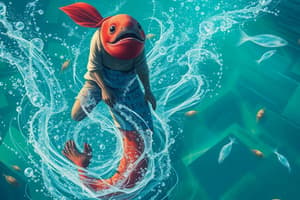Podcast
Questions and Answers
What is the main characteristic of artisan or inland fisheries?
What is the main characteristic of artisan or inland fisheries?
- It involves fish catch from freshwater bodies like rivers and lakes. (correct)
- It uses advanced fishing technology and large vessels.
- It requires significant financial investment for setups.
- It primarily involves catching fish from the ocean.
Which type of gear is commonly used in artisan fishing?
Which type of gear is commonly used in artisan fishing?
- Underwater cages and pens
- Automated nets and drones
- Sonar equipment and trawlers
- Simple gear like hooks and traps (correct)
Where do most artisanal fishing activities occur in Nigeria?
Where do most artisanal fishing activities occur in Nigeria?
- In the Arctic seas
- Along coastal fishing areas and inland water bodies (correct)
- Primarily in large commercial fishing farms
- In artificial lakes designed for aquaculture
What distinguishes distant water or marine fisheries from artisan fisheries?
What distinguishes distant water or marine fisheries from artisan fisheries?
What is a feature of the crafts used in artisan fishing?
What is a feature of the crafts used in artisan fishing?
Which of the following is NOT a type of aquatic habitat?
Which of the following is NOT a type of aquatic habitat?
What classification would a fishery in a lake fall under?
What classification would a fishery in a lake fall under?
Which type of fishery is associated with saltwater environments?
Which type of fishery is associated with saltwater environments?
What is a characteristic of brackish water fisheries?
What is a characteristic of brackish water fisheries?
Which habitat is defined by its location where fresh and saltwater mix?
Which habitat is defined by its location where fresh and saltwater mix?
Flashcards are hidden until you start studying
Study Notes
Capture Fisheries
- Involves catching fish from natural water bodies like rivers, lakes, and oceans.
- Classified into Artisan (inland) fisheries and Distant water (marine) fisheries.
- Artisan fisheries utilize simple gear and crafts, primarily along Nigeria’s coastal areas and lakes like Lake Chad.
- Distant water fisheries employ large vessels for long-distance trawling and industrial fishing to meet global fish consumption needs.
Fisheries Science
- Studies organisms in aquatic habitats including marine, freshwater, and estuarine environments.
- Fisheries are categorized based on habitat: Marine Fisheries, Freshwater Fisheries, and Brackish Water Fisheries.
Mode of Exploitation
- Fisheries are classified based on exploitation mode into:
- Capture fisheries: Harvesting from natural ecosystems.
- Culture fisheries: Domestication and rearing of fish in controlled environments (aquaculture).
Classification of Aquatic Organisms
- Microscopic plants: Include algae and diatoms like Biddulphia sp.
- Macroscopic plants: Examples are water hyacinth and Pistia.
- Microscopic animals: Include Copepods and Daphnia.
- Bony fishes: Examples are Tilapia sp. and Clarias gariepinus.
- Cartilaginous fishes: Include sharks, whales, and stingrays.
- Shell fishes: Categories include molluscs (scallops, oysters) and crustaceans (shrimp, crabs).
Definition of Fisheries
- Refers to all processes involved in fish production, processing, marketing, and distribution.
- Covers the study of aquatic organisms and their habitats, which spans microscopic to macroscopic entities.
Culture Fisheries
- Involves rearing fish in controlled settings such as ponds, tanks, and cages, known as aquaculture.
- Gaining global popularity due to declining capture fisheries, lower quality of fish catches, pollution, and rising fishing costs.
Distant Water or Marine Fisheries
- Characterized by large vessels equipped for long-distance fishing and effective storage.
- Key contributor to global fish supply, but faces challenges such as pollution, overfishing, and high operational costs leading to decline in fish catch.
Studies of Culture Fisheries
- Encompasses several disciplines including:
- Fish breeding and propagation.
- Fish nutrition.
- Rearing and management systems.
- Fish preservation and marketing.
- Fisheries economics.
- Water quality management.
Classification Based on Climatic Conditions
- Fisheries further classified into Temperate and Tropical categories based on geographical climate.
- Temperate fisheries: Found in water beyond tropical regions, experiencing seasonal changes.
- Tropical fisheries: Located between the tropics of Cancer and Capricorn, with high temperatures ranging from 21-32°C and distinct wet and dry seasons.
Studying That Suits You
Use AI to generate personalized quizzes and flashcards to suit your learning preferences.



